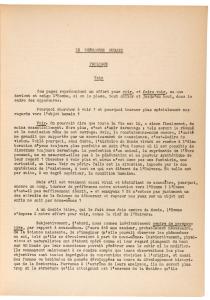Le Phénomène Humain.
Eur 4,500 / USD 5,000
The price shown on each item does not include V.A.T (Value Added Tax). As a result of the recent EU legislation we are required to charge our EU customers the percentage of V.A.T. charged by the customer’s country of residence, unless they possess a V.A.T. registration number. Postage Additional.
Rome, 28 October 1948. 4to (273 x 218mm). pp. (8), ii, 174. Printed wrapper, paperbacked spine.
unrecorded privately issued edition of Teilhard de Chardin's famous work on evolution
The extremely rare and unrecorded privately issued edition of Teilhard de Chardin's famous work on evolution. The work was forbidden by the church and was published after the death of the author in 1955 in an edition of 500 copies. This privately issued edition was mimeographed and distributed to a very few friends and scientists. The 'Foundation Teilhard de Chardin' in Paris does not have a copy of the work.
Pierre Teilhard de Chardin was born in 1881 and died in New York 1955. He was a Jesuit priest, paleontologist and one of the most important and original thinkers of the 20th century. The years 1908-1912 had been of critical intellectual formation. He was influenced by Henri Bergson's 'Evolution Creatice' and the book would be of a critical influence on Teilhard's thinking as it set his lifelong interest on the subject of evolution. Teilhard de Chardin became professor of geology at the Catholic Institute of Paris. However soon his ideas about evolution were considered unorthodox by his religious superiors and he was forbidden to teach. He stayed a long time in China doing extensive research on mammalian fossil fauna. He was an advisor to the Geological Survey of China and undertook many expeditions, one of which unearthed the skull of the Peking man (Sinanthropus pekinensis).
When he came back to Paris he was forbidden to write about any philosophical subject. The biggest blow however was in 1950 when the Church forbid him to publish his major work 'Le Phénomène Humain'. "The Teilhardian thesis is not a scientific theory but, rather, a philosophical world view based on certain themes drawn from the evolutionary synthesis and expressed in mystical, often poetic terms. Teilhard discerned in the historical development of the cosmos a law of 'complexity-consciousness', a notion reminiscent of Haeckel's views of the psychic unity of the organic world, only extended on a cosmic scale to include the inorganic world. According to Teilhard's law, each succesive stage in the evolutionary process is marked, first, by an increasing degree of complexity in organization and, second, by a corresponding increase in degree of conciousness. Evolution thus proceeds in orderly fashion from the inorganic to the organic, from less complex to more highly organized forms of life, through the process of hominization and beyond to 'planetization,' wherby all the peoples of 'Homo sapiens' are to achieve collectively an ultrahuman convergence, seen symbolically as a final 'Point Omega'" (DSB).
Teilhard went in exile in New York in 1951, where he was invited by the Wenner-Gren foundation, to continue his paleontogical work. He died on Easter Day April 10th. 1955.
The 'Avertissement' is dated: Paris, Mars 1947. The last pages of the work is dated: Rome, 28 Octobre 1948. Ladislaus Polgár in his 'Internationale Teilhard-Bibliographie' mentions the fact that some of his writings were reproducted and known to a small group 'die zwar vervielfältigt einem engeren Kreis bereits bekannt waren, aber erst nach seinem Tod veröffentlicht wurden".





